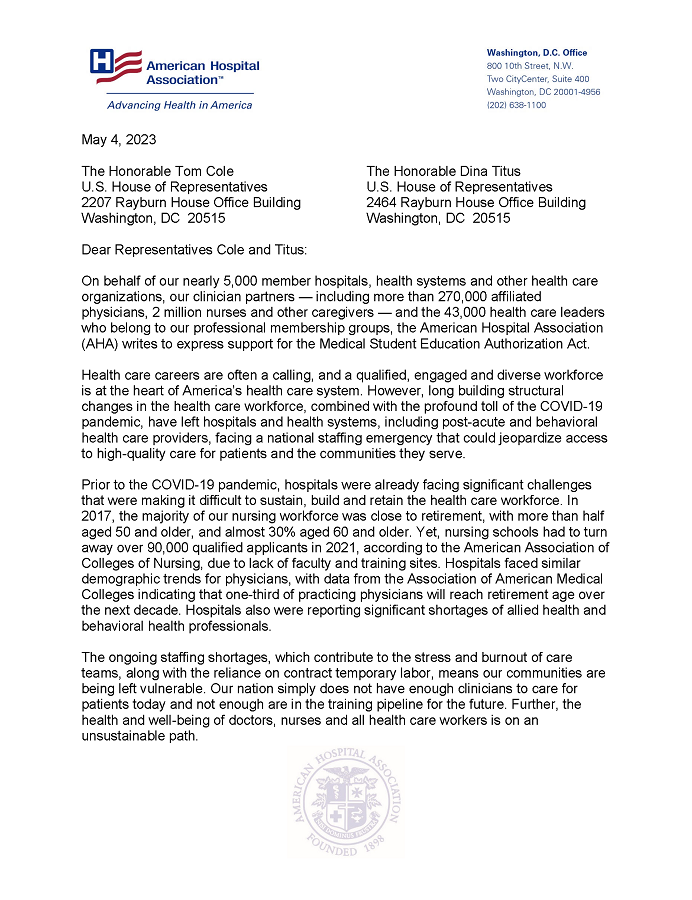

AHA Letter to House in Support of Medical Student Education Authorization Act
May 4, 2023
The Honorable Tom Cole
U.S. House of Representatives
2207 Rayburn House Office Building
Washington, DC 20515
The Honorable Dina Titus
U.S. House of Representatives
2464 Rayburn House Office Building
Washington, DC 20515
Dear Representatives Cole and Titus:
On behalf of our nearly 5,000 member hospitals, health systems and other health care organizations, our clinician partners — including more than 270,000 affiliated physicians, 2 million nurses and other caregivers — and the 43,000 health care leaders who belong to our professional membership groups, the American Hospital Association (AHA) writes to express support for the Medical Student Education Authorization Act.
Health care careers are often a calling, and a qualified, engaged and diverse workforce is at the heart of America’s health care system. However, long building structural changes in the health care workforce, combined with the profound toll of the COVID-19 pandemic, have left hospitals and health systems, including post-acute and behavioral health care providers, facing a national staffing emergency that could jeopardize access to high-quality care for patients and the communities they serve.
Prior to the COVID-19 pandemic, hospitals were already facing significant challenges that were making it difficult to sustain, build and retain the health care workforce. In 2017, the majority of our nursing workforce was close to retirement, with more than half aged 50 and older, and almost 30% aged 60 and older. Yet, nursing schools had to turn away over 90,000 qualified applicants in 2021, according to the American Association of Colleges of Nursing, due to lack of faculty and training sites. Hospitals faced similar demographic trends for physicians, with data from the Association of American Medical Colleges indicating that one-third of practicing physicians will reach retirement age over the next decade. Hospitals also were reporting significant shortages of allied health and behavioral health professionals.
The ongoing staffing shortages, which contribute to the stress and burnout of care teams, along with the reliance on contract temporary labor, means our communities are being left vulnerable. Our nation simply does not have enough clinicians to care for patients today and not enough are in the training pipeline for the future. Further, the health and well-being of doctors, nurses and all health care workers is on an unsustainable path.
These shortages contribute to a national emergency that demands immediate attention. Your bipartisan bill, the Medical Student Education Authorization Act, provides one important remedy to the current situation. The legislation would provide grants to public institutions of higher education to expand or support graduate education for physicians and focuses these grants to institutions in states with the most severe primary care provider shortages. Training experience in medically underserved communities increases a physician’s cultural awareness of such areas and the likelihood that physician will practice there.
Thank you for your leadership on behalf of the nation’s health care workforce. AHA looks forward to working with you to enact this important legislation.
Sincerely,
/s/
Lisa Kidder Hrobsky
Senior Vice President, Advocacy and Political Affairs


